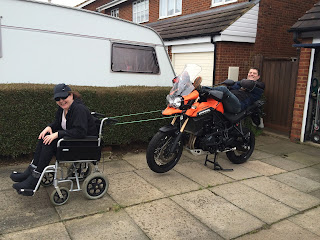Throughout Foggy's life I have made a point of saying I am lucky enough to not suffer from M.E./C.F.S chronic pain. However, things have started to change over the past 3 months. I am currently undergoing tests and physio to try to deal with an extremely painful right arm. RSI, Carpal Tunnel and Tendonitis have been ruled out and the physio believes it to be a nerve issue. I know this doesn't 100% mean that it is yet another M.E.C.F.S. symptom to deal with but the odds are quite high! Obviously, having Hypermobility Syndrome confuses things even further when added to the mix!
I am writing this blog today because my initial physio assessment yesterday
the questions were as follows:
- Do you experience dizziness?
- Do you experience balance issues?
- Do you experience nausea?
- Do you experience blurred vision?....
It was a long list so I won't go through all of it, I'm sure you get the idea!
It struck me that I could have an underlying illness, not connected to M.E. but we (combination of doctors and myself) wouldn't be able to tell as M.E overlaps EVERYTHING! So much health stuff can be found under the umbrella of M.E it is difficult to estimate where M.E stops and something else takes over.
At the moment, my right arm hurts from my hand up to my armpit. Most of the pain is in the crook of my elbow though and so any time I bend my arm - typing on my mobile phone is EXCRUCIATING - I am in pain. I have decided that once Foggy finishes on Friday I am going to remove social media from my phone. The combination of less mobile use and less laptop work for Foggy will hopefully help the problem. It won't fix it though.
It is slightly worrying that my M.E.C.F.S. is changing/getting worse but I am altering my lifestyle to adapt to the changes. My GP has said the best approach is physio and painkillers. I am not keen to start on more medication but sometimes the pain takes my breath away so it's a case of needs must. I am hopeful that a year-long break from Foggy will allow my body the chance to settle down and rest properly. My current situation is not helping my severity level either. Being unemployed and actively looking for work is stressful....stress and M.E.C.F.S. do not work well together!
Love,
Sally xx
p.s. There are 2 days left! Please donate if you haven't done so already! Donate via mefoggydog.org. Thank you xx







